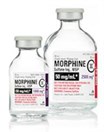Access to essential medicines for palliative care
Katherine Pettus, representing IAHPC explains how the CND is changing its view of access to essential medicines for palliative care.
9 Apr 2014Katherine Pettus, PhD, represented the International Association for Hospice and Palliative Care (IAHPC) at the Vienna NGO Coalition on Drug Policy in Austria. She explains how the Commission on Narcotic Drugs is changing its view of access to essential medicines for palliative care.
The issue of lack of access to opioid analgesics in 80% of the world, drew unprecedented attention at the recent High Level Segment of the Commission on Narcotic Drugs (CND) and the annual (57th) session held on 13/14 March in Vienna. Although the WHO (World Health Organization) classifies opioids such as morphine, used for the relief of severe pain, and methodone used for dependency treatment, as “essential medicines,” access to both is internationally restricted, since they are “scheduled” under the three drug control treaties supervised by the CND. Palliative care physicians in lower and middle-income countries confront multiple legal and regulatory barriers in accessing controlled medicines.

Dr Vladimir Poznyak (WHO), called the inequity of access to pain medicines a “scandal” at the Informal Civil Society Hearing. Norway referenced the “tragedy” of inadequate access to essential medicines, while Switzerland pointed out that “we need to recognise the suffering this causes as an unintended and unacceptable side-effect of drug control.” Australia cited the “moral imperative” of ensuring that all doctors be able to access medicines for their patients needing pain relief. India referenced the recent passage of the amendment to the NDPS (Narcotic Drugs and Psychotropic Substances) Act, and the essential role of civil society, including the palliative care community, in educating lawmakers.
The whole article along with interesting film clips can be seen here
Share this on: